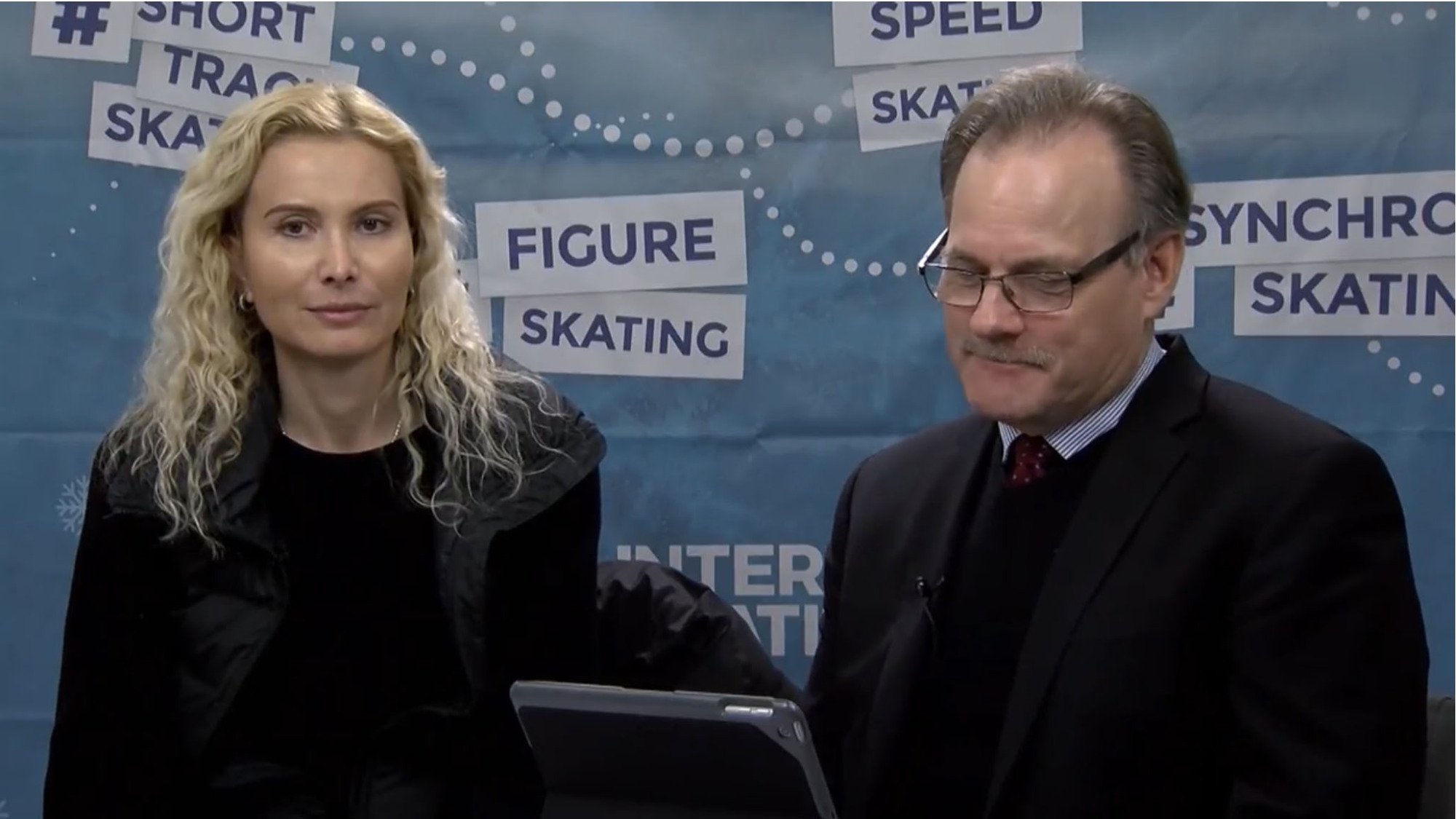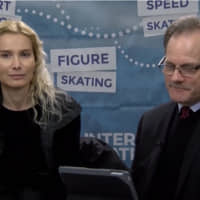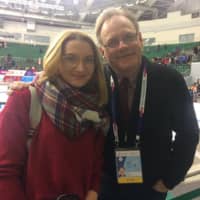For the past several years, announcer Ted Barton's goal has been to help globalize figure skating by providing free video streams of the sport to skaters, fans and media.
The Canadian's quest began at home where he set up streams along with Skate Canada to help youngsters in remote areas of the country see what fellow competitors were doing and learn from them. Barton then took his vision to the International Skating Union, which approved free streams on YouTube for the Junior Grand Prix circuit beginning in 2014.
Now Barton has added another interesting project and accomplishment by commentating on the inaugural worldwide stream of the Russian nationals last month in Krasnoyarsk. Channel 1 Russia asked him in the fall if he would be interested and he considered it such an honor that it was impossible to say no.
Barton provided the call of the three-day competition from a city in Siberia and described it as "an incredible experience."
"I left Vancouver on Dec. 23 and arrived on Christmas morning," Barton told Ice Time from his home in British Columbia. "It was over 30 hours to get there. The event began the following day."
Barton was impressed by what he witnessed while making history.
"I have to give great credit to the Russian federation for not just the skating, but the organization of the competition was at such a high level," Barton said. "It's just like Japan now. Japan always runs so efficiently.
"What a well-run event. Completely sold out like it would be in Japan. The skating is quite remarkable, with the ladies being the highlight. The men are all good skaters, but did not skate particularly well."
Barton said the trip was educational for him.
"Seeing how the sport is run in different countries is so interesting," Barton stated. "Culturally it is very different, because the costs of entering skating in Russia are virtually nonexistent compared to North America or even Japan. The costs are not the same."
Barton marveled at the depth in the ranks of the Russian female skaters.
"All of their ladies are highly skilled all the way down to the bottom," Barton commented. "Their No. 17 would win the nationals in many other countries."
Barton spoke of some of the differences from the JGP to the Russian nationals broadcast.
"The feed came from Russia's TV1, but there were challenges translating from Russian to English for the scoring part so I often did not have the scores or standing information," the 65-year-old remarked. "That can happen from time to time so one just has to adjust.
"I didn't control the replays, which I do in the Junior Grand Prix. In the Junior Grand Prix, I can tell my own story, because I can call the replays that I want and therefore explain what happened in that program in much more detail. In the JGP we really do control a lot, so to a certain degree it is easier for me."
Support, appreciation given
I wondered if Barton had a bilingual assistant working alongside him in Russia.
"I did not. I did have a producer who was dedicated to our English worldwide stream," Barton stated. "I didn't have anybody sitting with me, I did have a wonderful producer in the truck to help me with timing and any other support I required."
Barton was moved by the way he was warmly received by the Russian coaches at the event.
"What was really nice for me was that the coaches were so supportive and thankful that I was there," Barton commented. "It was shocking to me in some ways. Alexei Mishin, Tamara Moskvina, Eteri Tutberidze and many other coaches I see on the JGP were warmly thankful that I was there to help cover the nationals worldwide. It was a real honor and I was very humbled by the warm reception both from the federation and all the coaches.
"Also, the iconic Tatiana Tarasova, who does the Russian television commentary, was very nice and supportive," Barton added.
What has endeared Barton to many viewers over the years is his positive outlook while describing the action.
"After six years on the Junior Grand Prix, my assessment is this: the world is full of negativity, lashing out, meanness. Social media has created trolls, who can just lash out and say things," Barton said.
"It's so negative, that it is just stressful in life. I've decided to look at what is good in the athlete, a person trying to do their best. Be supportive in the effort, be honest in the analysis. I think some people have gravitated to that because at times the world is so damn (pardon me) negative. That's one of the positives that has come out of this. It's not about me, it is about the approach."
Ice Time asked if Barton supplemented the stream with interviews.
"I didn't do any interviews of the skaters. With television it was a complicated thing," Barton noted. "They are doing a national broadcast to many millions of viewers, which is the main priority, and it's the first time ever with an English live stream feed. I was honored to be the commentator. We had over one million views in the three days. That's very good worldwide."
Impressed with facilities
Barton was wowed by the event venue in Krasnoyarsk.
"The rink holds about 7,500. The facilities are spectacular," Barton stated. "One of the most interesting things that I'm learning about Russia, is that the cities, many of which we have never heard of before, the infrastructure is new. They are being built up and modernizing.
"The city of Krasnoyarsk (which is a 4.5-hour flight east from Moscow), which I had never heard of, has over a million people. It has some beautiful facilities. It is a really nice city. Siberia, which we think of as just a frozen part of the world, has many cities that are growing."
Barton talked about his experience earlier this season in a different Russian city.
"The Russian nationals will be in Chelyabinsk next year. That was unbelievable what they did at the Junior Grand Prix this season," Barton remembered. "It is a very developing part of the world, outdoors and natural. Russia is just like anywhere else. Put world politics aside and talk about people, families, cities, lifestyle, it's just like anywhere else."
Barton said fans at the Russian nationals were especially nice to him.
"The people were terrific. The building was packed. People were very kind, warm and happy," Barton remarked. "I had a lot of people came down for pictures or autographs. There is a big following for the Junior Grand Prix."
How JGP role evolved
Barton then provided more of the backstory about how he came to be in the announcer's seat for the JGP.
"The original vision from eight years ago for the streaming when I went to the ISU, was for me to produce it, it wasn't about me announcing," Barton commented. "It was never my goal to be the announcer. It was a necessity, because they didn't have anybody else coming. It just happened that way."
Barton's altruism in expanding the sport is admirable.
"What I am most interested in is this world around us and our sport is dramatically changing globally," Barton said. "That is why I do this. That is why I spend the time, the effort and the energy to do it.
"Skating is strong in Japan, it's strong in Russia, it's good here in Canada. It's good in the (United) States and getting stronger," Barton cited. "But the sport will not grow unless it grows around the world, and what we are doing with streaming is exactly that. We are globalizing the sport. That is why I do it.
"I only have a number of years left in the sport, but I am on a mission to globalize the sport as much as possible," Barton continued. "What I care is that Russia opens its doors. It did. That Canada opens its doors. We have. The ISU is opening its doors. It did and is."
Barton tries to be compassionate with his skating analysis.
"It is not for me to say what is right and what is wrong. My approach is always respecting the athlete and the effort they make," Barton commented. "Always remember these are young people emotionally engaged in a sport and even though they have the courage to put their presentation at center ice and receive judgment they are human. Respect the moments of joy and disappointment."



















With your current subscription plan you can comment on stories. However, before writing your first comment, please create a display name in the Profile section of your subscriber account page.